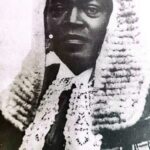JONATHAN, LEBUA
- 2 Min Read
Chief Lebua Jonathan (October 30, 1914-April 5, 1987), prime minister of Lesotho for the first 20 years after independence was gained in 1966, was a great-grandson of Moshoeshoe.

PHOTO CAPTION: Lebua Jonathan SOURCE: EA Library
After attending a mission school, he worked in the South African mines. In 1951 he was urged to enter politics by his friend, Patrick Duncan, who was, at the time, the judicial commissioner for Lesotho. He was first elected to the district council of Leribe, and later to the National Council. He was also an advisor to the regent paramount chieftainess Mantesbo.
In 1957 Jonathan went to London as a member of a delegation opposing the appointment of Mr. A.G.T. Chaplin, a South African, as resident commissioner. He returned to London to negotiate constitutional changes in 1958.
He was a member of a Constitutional Review Committee which resulted in the introduction of representative government in Lesotho. In 1959 he founded the Basuto National Party. In 1964 he again went to London to demand responsible government; as a result, a general election followed. Jonathan won a seat in a by-election at Mpharawe, and became the first prime minister of Lesotho on July 5, 1965.
Jonathan had an absolute majority until 1970 when he declared a state of emergency and suspended the constitution. In 1967 he visited South Africa for talks with Prime Minister Vorster. In 1982 he agreed to permit Communist nations to open embassies in Lesotho. In 1985 South Africa accused Lesotho of becoming a major base for African National Congress guerrillas and imposed a blockade of this country. The blockade lasted three weeks, after which Chief Jonathan was overthrown by a military coup in January 1986. He was, for a time, placed under house arrest. In 1987 Chief Jonathan died of stomach cancer in a hospital in Pretoria, South Africa. He was 72 years old.
KEITH IRVINE




